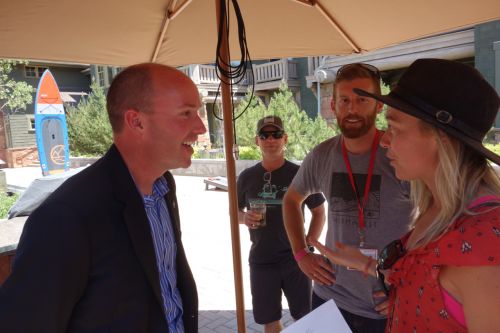PARK CITY, Utah (BRAIN) — The election of Donald Trump contributed to the outdoor industry's decision to move its major trade show out of Utah after 21 years in the state, two state officials told journalists Wednesday.
Lt. Gov. Spencer Cox said state and Salt Lake City officials had been negotiating for years about hosting the Outdoor Retailer trade show. But those negotiations broke down early this year. Many major outdoor brands, including Patagonia and REI, were critical of Utah after Gov. Gary Herbert petitioned Trump to reverse President Obama's decision to create Bears Ears National Monument late in his term. The Trump administration is still considering the request.
But Cox said the outdoor industry became alarmed over Trump's election, and that climate forced a decision on pulling out.
"We'd been having these (negotiations) for years. ... Every year, we sit down and get close to the same page and then we move forward," Cox told journalists at the Outdoor PressCamp here. "The only thing that changed this year was Donald Trump got elected. ... Nothing changed on our end, but suddenly you had Bears Ears and Bears Ears (National Monument status) could go away and it was a bridge too far for a lot of people."
Outdoor Retailer announced in February that it would not hold shows in Utah after next month's Summer show. Last month OR's parent company, Emerald Expositions, announced it had bought the SIA Snow Show and would combine the Snow Show and the OR Winter Show in Denver in 2018. Emerald has not announced the venue for its 2018 summer show. Emerald also owns Interbike, which also has announced it will not hold its show in Utah.
Cox said the move will ultimately be a setback for the outdoor industry.
"The thing that makes me sad is not that we lost the revenue from the Outdoor Retailer show. We'll replace that — we have a lot of people that want to come out here and have conventions. What makes me sad is that there are a lot of people on the other side that were really happy that Outdoor Retailer is leaving because now we don't have to listen to them anymore. I think it set things back a decade because the outdoor rec industry had worked so hard to get a seat at the table and were a force, and now the people who were fighting them all the time, the extreme voices on my team, feel like they don't have to listen to them anymore and that it was a win. I wish OR hadn't given up its seat at the table."
Tom Adams, the director of the state Office of Outdoor Recreation, also blamed "the Trump Effect" for the OR pullout.
"Heels were dug in and they said, 'we don't hear you saying what we want to hear and we are going to part our ways,'" Adams said.
Adams and Cox spoke to bicycle and outdoor industry journalists and industry members who are attending the Outdoor and Bike PressCamp events here this week. PressCamp organizers brought the state officials in to present the other side of the debate over public lands in Utah.
Adams and Cox said fears about Utah privatizing Bears Ears are unfounded. Cox said the state has never privatized public lands and that a recent state law change makes it even more difficult to do so. He said federal management of protected lands is no prize, pointing to the disruption that occurred when the federal government shut down in 2013. The shutdown led to the state having to temporarily operate some National Parks.
National Parks in Utah, and nationwide, also have struggled for decades with operating budgets that haven't kept up with growing visitor counts. Many parks have deferred maintenance projects for years because of the tight budgets.
Cox also said many residents who live near Bears Ears are not in favor of the National Monument designation because it will increase visitation and prevent historic use of the area, including hunting and some offroad motor vehicle and mountain bike use.
Golden Harper, the founder of Utah-based Altra Footwear, joined the panel with Cox and Adams. Harper said he had been backpacking in the Bears Ears region for decades and is in favor of protecting some parts of it from development or oil and mineral extraction.


